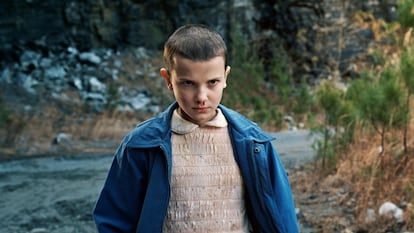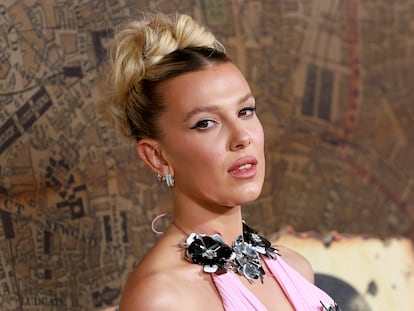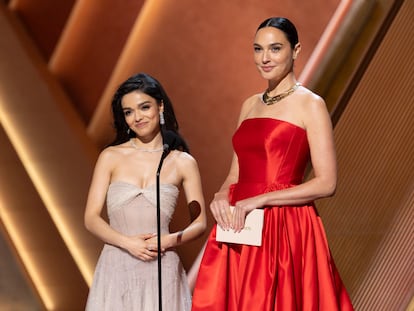Millie Bobby Brown, the Netflix algorithm queen who lives on a farm with more than 45 animals
The ‘Stranger Things’ actress, who stars in the new film ‘The Electric State,’ lives far away from Hollywood with horses, cows, sheep and a blind donkey

Millie Bobby Brown is a movie star, yet she has never had a leading role in a theatrical release. She stays off social media and doesn’t live in Los Angeles, but on a farm with her husband, Jake Bongiovi —son of musician Jon Bon Jovi — alongside more than 45 animals. Despite her unconventional lifestyle, Brown has been one of Hollywood’s most recognizable faces for nearly a decade. Even more surprisingly, at just 21, she has been able to control of her career, serving as an executive producer on most of her projects. After four blockbuster hits on Netflix, the iconic Eleven from Stranger Things has become the queen of the algorithm.
Her latest film, The Electric State, is a sci-fi adventure directed by the Russo brothers (Avengers: Endgame). Set in a 1990s world where humans have imprisoned robots after a brutal war, the film carries a staggering price tag. According to Deadline Hollywood, Netflix spent $320 million on the production — more than the last 15 Oscar winners combined. To put it in perspective, that’s enough to fund 53 films like Anora, this year’s Best Picture winner, as one reviewer on the film platform Letterboxd pointed out.
But Netflix has placed full confidence in its stars, Brown and Chris Pratt, entrusting them with the bulk of the film’s promotion. Their names alone fuel the platform’s recommendation system: once viewers finish a film featuring either of them, another one automatically appears in their queue.
Millie Bobby Brown’s track record as a Gen Z icon has earned Netflix’s full confidence. Damsel, the fantasy epic she both starred in and executive produced, cost around $70 million to make and became the platform’s most-watched film of 2024, securing the ninth-best opening in its history. The film, directed by Juan Carlos Fresnadillo, relied almost entirely on Brown’s star power — she spent more than 20 minutes alone on screen, battling to escape a dragon’s cave. “Millie is a force of nature: unpredictable and dazzling,” Fresnadillo told EL PAÍS via email.
“Her charisma and instinct make her an actress who continues to grow film after film. Working with her was an adventure, almost a roller coaster. That intensity was projected in the story of survival and transformation of a woman discovering her inner strength,” the director added.
Given how closely this parallels Brown’s own career journey, it’s no surprise she chose Damsel specifically chose the proejct — just as she personally sought out her first major film success: Enola Holmes (2020). The movie, based on the Sherlock Holmes spinoff novels, was born from her love for the young adult series, which she had read with her sister. She was so passionate about the project that she pitched it herself to Legendary — the studio behind her two Godzilla films — and to Netflix, which, by 2019, after three seasons of Stranger Things, was eager to lock in the future of its star. By the time Enola Holmes 2 came out in 2022, Brown was earning $10 million per film, according to Vanity Fair — the highest salary ever recorded for an actor under 20.
The Enola Holmes films, one of the few Netflix franchises to secure a sequel, earned both critical acclaim and strong viewership. Damsel also proved a streaming hit, though it received a lukewarm 56% positive rating on Rotten Tomatoes — still far better than The Electric State, which was panned by critics and scored a dismal 15% and disappointing returns for such a high-budget production. Despite this, Netflix is still not considering bringing such expensive projects to theaters for revenue. Instead, they prefer to let their algorithm continue to recommend the movies.
Farm life
But the noise of Hollywood criticism barely reaches Brown, who lives far from the industry’s chaos on a Georgia farm she discovered while filming Stranger Things in Atlanta. It sits across from another home her family purchased — both funded by her earnings from the series. Her parents, aware of the challenges of growing up in the spotlight, wanted her to live away from the pressures of Los Angeles. “I grew up with no money,” she shared on the Call Her Daddy podcast. “I remember buying a house with my parents and being able to do that because, for the first time, we were able to actually not be scared about renting and the landlords.”
Brown describes herself as “traditional but unconventional.” Along with her farm, which is home to horses, cows, sheep, a blind donkey, and 10 dogs, she runs an animal shelter where 23 more dogs live. In total, she has 62 animals and has even taken veterinary classes. At the same time, she enrolled in university to study human services as part of her work as a UNICEF ambassador. But she didn’t stop there: at 15, she founded the Gen Z beauty brand Florence by Mills, named after her grandmother, and at 19, she wrote her first novel, Nineteen Steps, inspired by the World War II stories her grandmother shared with her.

Amid all her passions, acting is the one that has been with her since childhood. At eight years old, after moving from London to Orlando, where her parents owned a teeth-whitening business, Bobby Brown began landing roles in TV shows like Once Upon a Time in Wonderland, where she played young Alice, Modern Family, and Grey’s Anatomy.
“I enjoyed being different people because I always struggled with self-identity,” she told Allure magazine. “I always felt like I didn’t quite belong in every room I was in. I also struggle with loneliness a bit. I always felt quite alone in a crowded room, like I was just one of a kind, like nobody ever really understood me.”
At just 10 years old, she was told at an audition that she was “too mature” for a role. Then came Stranger Things, where her shaved-head, super-powered Eleven — a victim of secret scientific experiments — needed that depth. Nine years later, the phenomenon continues, with the final season set to premiere in 2025, bringing Bobby Brown back to the promotional spotlight. In the series, however, she remains 14, while in real life, she’s now 21.
But there was another side to the sudden phenomenon. Brown stepped back from social media at 18 when Eleven — still a teenager in the series — began to be sexualized. She felt the internet was no longer a “safe” place to interact with fans. Even today, her public life draws constant criticism, from her appearance to everything she does. With the release of The Electric State, several commentators mocked her adult appearance.
“A thing that I get a lot is like, ‘Oh my God, she looks like 40,‘” Brown said on the podcast. “And I’m like, well yeah, you did meet me when I was 10, so I understand. Now I’m 21, it’s been 10 years. She grows. My face like, grew. What do you want me to do about that?”
“I remember trying to change myself to please the masses,” she continued. “My face does grow. I do wear a lot of makeup. It’s just the kind of person I am. I like that. It’s fun for me. You’re not going to tell me how to be a girl, you’re not going to tell me how to be a woman.”
In an interview with Vanity Fair, the actress admitted: “I don’t have many friends, because of who I am. I didn’t go to school, so I don’t have the best social skills.”
She’ll be able to retire there when the algorithm is no longer counting on her. For now, after Stranger Things and the third Enola Holmes movie, she’s signed another film with Netflix. According to Bloomberg, in the third season of Stranger Things, she earned $250,000 per episode. Millie Bobby Brown is the closest thing to those classic movie stars who had exclusive contracts with a studio. It was their home — like Marilyn Monroe with Fox or James Stewart with MGM. The difference today is that she’s a movie star without stepping foot in a movie theater.
Sign up for our weekly newsletter to get more English-language news coverage from EL PAÍS USA Edition
Tu suscripción se está usando en otro dispositivo
¿Quieres añadir otro usuario a tu suscripción?
Si continúas leyendo en este dispositivo, no se podrá leer en el otro.
FlechaTu suscripción se está usando en otro dispositivo y solo puedes acceder a EL PAÍS desde un dispositivo a la vez.
Si quieres compartir tu cuenta, cambia tu suscripción a la modalidad Premium, así podrás añadir otro usuario. Cada uno accederá con su propia cuenta de email, lo que os permitirá personalizar vuestra experiencia en EL PAÍS.
¿Tienes una suscripción de empresa? Accede aquí para contratar más cuentas.
En el caso de no saber quién está usando tu cuenta, te recomendamos cambiar tu contraseña aquí.
Si decides continuar compartiendo tu cuenta, este mensaje se mostrará en tu dispositivo y en el de la otra persona que está usando tu cuenta de forma indefinida, afectando a tu experiencia de lectura. Puedes consultar aquí los términos y condiciones de la suscripción digital.
More information
Archived In
Últimas noticias
Most viewed
- Sinaloa Cartel war is taking its toll on Los Chapitos
- Oona Chaplin: ‘I told James Cameron that I was living in a treehouse and starting a permaculture project with a friend’
- Reinhard Genzel, Nobel laureate in physics: ‘One-minute videos will never give you the truth’
- Why the price of coffee has skyrocketed: from Brazilian plantations to specialty coffee houses
- Silver prices are going crazy: This is what’s fueling the rally













































